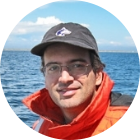The Consortium’s first and current Executive Committee is made up of the Steering Committee. It is responsible for tending to memberships, reviewing and coordinating Consortium activities, facilitating external relations, and writing and distributing an annual activity report.
The founding members of the IndoCet Consortium are the individuals who participated in the MIROMEN workshop in 2014.

Violaine Dulau, Ph.D, Chair
Research director, Globice
My PhD was dedicated to sperm whale ecology in the Mediterranean Sea and addressed a wide range of topics related to the species’ distribution, social structure, diving and acoustic behavior, and population genetics.

Salvatore Cerchio, Ph.D, Vice-Chair
Marine biologist, New England Aquarium
I have been studying cetaceans for 36 years around the world.
I have been working in Madagascar since 2004, studying cetaceans from humpback whales to coastal dolphins to Omura’s whales.

Alexandre Zerbini, Ph.D.
Marine biologist, NOAA
I have been studying marine mammals since 1992. I studied taxonomy of southern minke whale species while a masters student in Brazil. I pursued a Ph.D. at the University of Washington and graduated in 2006.

Tim Collins
Conservation Scientist, WCS
I have researched cetaceans in the Middle East and Africa for the past 25 years, focussing principally on humpback whales and coastal dolphins. I currently live in Kenya and help to guide cetacean science and conservation efforts in Africa for the Wildlife Conservation Society.

Dr. Stephanie Plön
Medical Virology, Department of Pathology, Stellenbosch University, South Africa
I have been researching cetaceans in Eastern Cape waters, South Africa, for the past 27 years, focusing on the general ecology of local species, including their natural history, reproductive biology, and trophic ecology, but also anatomy, population ecology and genetics, strandings, pathology and health assessments.

Anjara Saloma
PhD Student, Antananarivo Univ., Paris-Sud Orsay Univ., Cétamada
I have been working for marine mammal research and conservation programs in Madagascar since 2011. I am involved in scientific research programs (tagging, acoustic studies, photo-identification) and in all programs related to community-based development.

Sabrina Fossette, Ph.D.
Scientific advisor, Megaptera
I have been Megaptera’s scientific advisor since 2009. I have a PhD in behavioral and movement ecology. For the past 15 years, I have been working on a range of marine species such as humpback whales, sperm whales …

Claire Garrigue, Ph.D.
Marine biologist, Opération Cétacés
The goal of my work is to determine the population status of humpback whales that over-winter in the lagoons of New Caledonia. The field methodology for this long-term study (now running for over 18 years) is based on photo-identification.